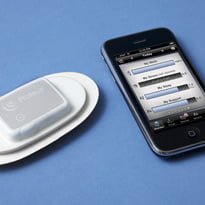Smart pills containing a microchip that can monitor a patient’s medication and condition will be sold in Lloyds pharmacies by September.
The high street pharmacy chain has signed a deal with US company Proteus Biomedical, to distribute a “digital health product” called Helius.
The Helius system involves patients taking a sugar pill containing an "ingestible event marker" which can monitor when drugs are taken and how much. It also monitors a patient’s heart rate, respiration, body posture and sleeping patterns.
The tiny chip – about the size of a grain of sand – runs on an electric charge generated by a patient’s stomach acid and is detected through a disposable “receiver” patch on the skin. The monitoring data can then be transmitted to a smartphone or their doctor’s computer.
The Helius system allows patients or carers to keep up-to-date with their condition and gives doctors the necessary information to change dosage or medication depending on what they see.
The system is estimated to cost £50 a month and is not covered by the NHS.
The World Health Organisation estimates half of patients fail to take their medicines correctly. Unused prescription medicine is estimated to cost the NHS nearly £400m a year.
Steve Gray, Lloydspharmacy healthcare services director, said Helius would take the company’s medication adherence offering to a whole new level.
“Anyone taking several medications knows how easy it can be to lose track of whether or not you’ve taken the correct tablets that day,” he said.
“Add to that complex health issues and families caring for loved ones who may not live with them and you can appreciate the benefits of an information service that helps patients get the most from their treatments and for families to help them remain well.”
Proteus chief executive Andrew Thompson said; “Proteus and Lloydspharmacy share a common vision of how advancements in technology can be captured to improve the wellbeing of patients struggling with complex medication regimes and health issues”.

